5 Best Demo Automation Software Options for Small Businesses
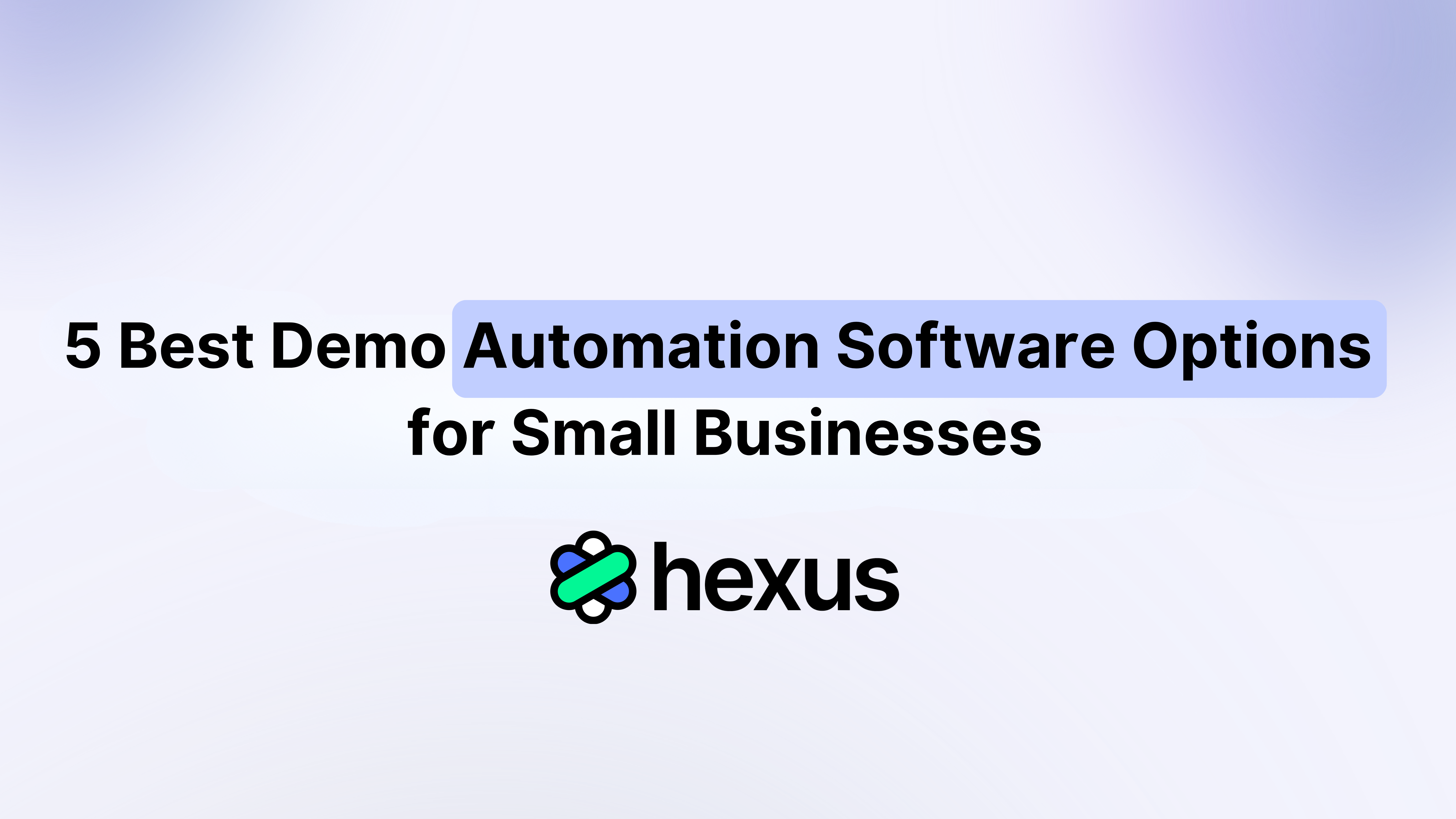
With the competitive digital marketplace today, small businesses require every advantage they can manage to acquire customers and accelerate growth. Among their greatest challenges is how they can present their product or service in such a manner that engages leads without wasting time and money. This is where demo automation software steps in.
Historically, live demos involved scheduling calls, making presentations, and manually taking each prospective customer through functionality. Although successful, the process was time-consuming, labor-intensive, and hard to scale.
Demo automation software alleviates these issues by enabling companies to design interactive, self-guided product demos that are instantly delivered to leads, embedded on websites, or customized for various customer segments.
For small businesses with thin staff and tight budgets, the proper demo automation tool can be a breakthrough. Not only does it save time, but it also produces a more professional customer experience, eventually closing deals quickly. But with all the options out there, how do you pick the right one?
In this blog, we’ll explore the 5 best demo automation software for small businesses in 2025. We’ll cover their features, benefits, and why they might be the perfect fit for your company.
Why Small Businesses Need Demo Automation Software
Before diving into the top tools, let’s understand why demo automation matters so much for small businesses.
Scalability Without Extra Cost
Small businesses often don’t have large sales teams. Automated demos allow you to reach more prospects without hiring additional staff.
24/7 Availability
Customers can explore your product anytime, anywhere—without waiting for a sales rep to schedule a call.
Consistency in Messaging
Every prospect sees the same polished version of your demo, ensuring that the core value of your product is communicated clearly and consistently.
Faster Sales Cycles
With automated self-guided demos, leads can qualify themselves up-front, so sales conversations occur with already interested leads.
Professional Branding
Automated demo platforms usually enable customization to reflect your company's brand identity to ensure small businesses appear as professional as larger rivals.
Now, let's take a look at the top 5 small business platforms to consider.
1. Hexus
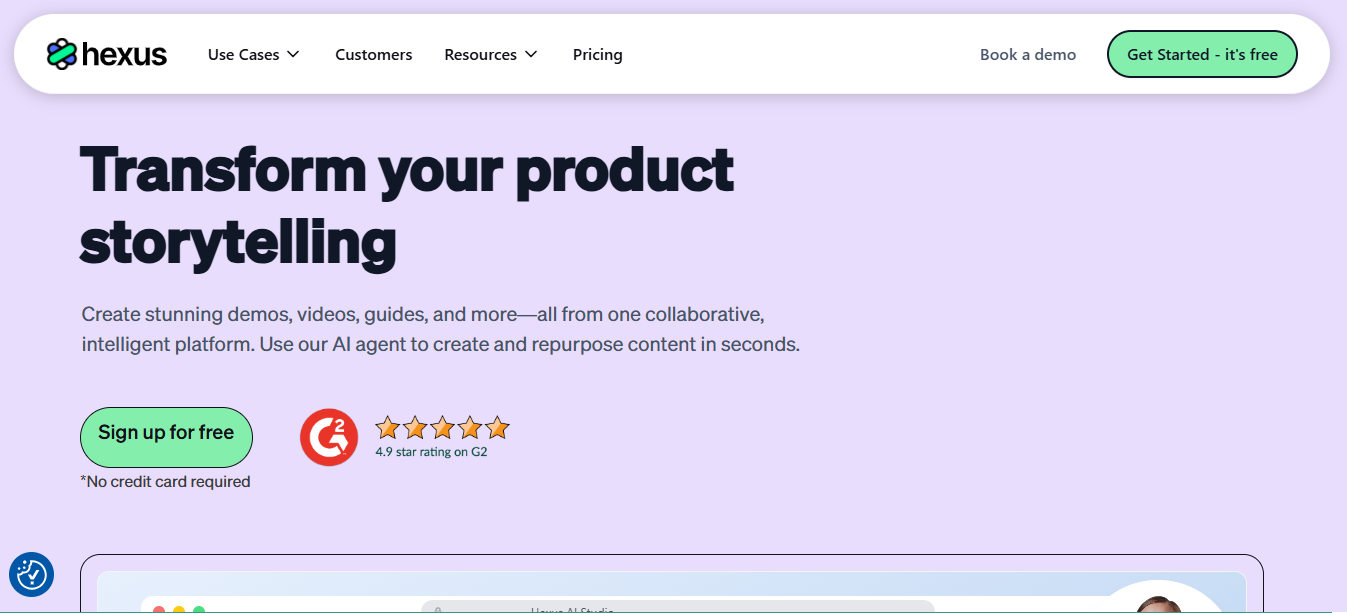
When it comes to simplicity, interactivity, and affordability, Hexus is among the best demo automation software for small businesses. With an easy-to-use interface, Hexus gives small teams the ability to develop interactive product demos without needing technical skills.
Key Features:
- Drag-and-Drop Demo Builder: Simply build guided product flows that mimic the user experience.
- Interactive Walkthroughs: Allow prospects to click through your product to discover features.
- Personalization: Tailor demos for various customer personas or industries.
- Analytics Dashboard: Monitor engagement rates such as views, clicks, and completion.
- Integration Support: Integrates with CRM platforms such as HubSpot or Salesforce for smooth sales processes.
Why It's Great for Small Businesses:
Hexus is all about ease of use, which is crucial for small businesses that don't have huge IT or design resources. The fact that it can customize demos for various clients without incurring high costs is excellent.
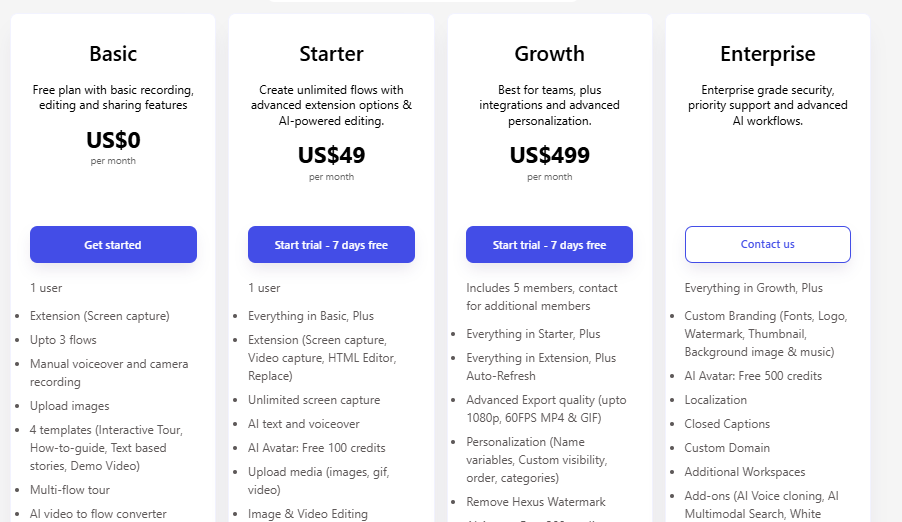
Example Use Case:
A small SaaS business can utilize Hexus to build a demo that's embedded in their website. As people interact with the demo, the analytics feature indicates which features they investigated the most. This assists the sales team in prioritizing follow-up calls to the most qualified leads.
2. Walnut.io
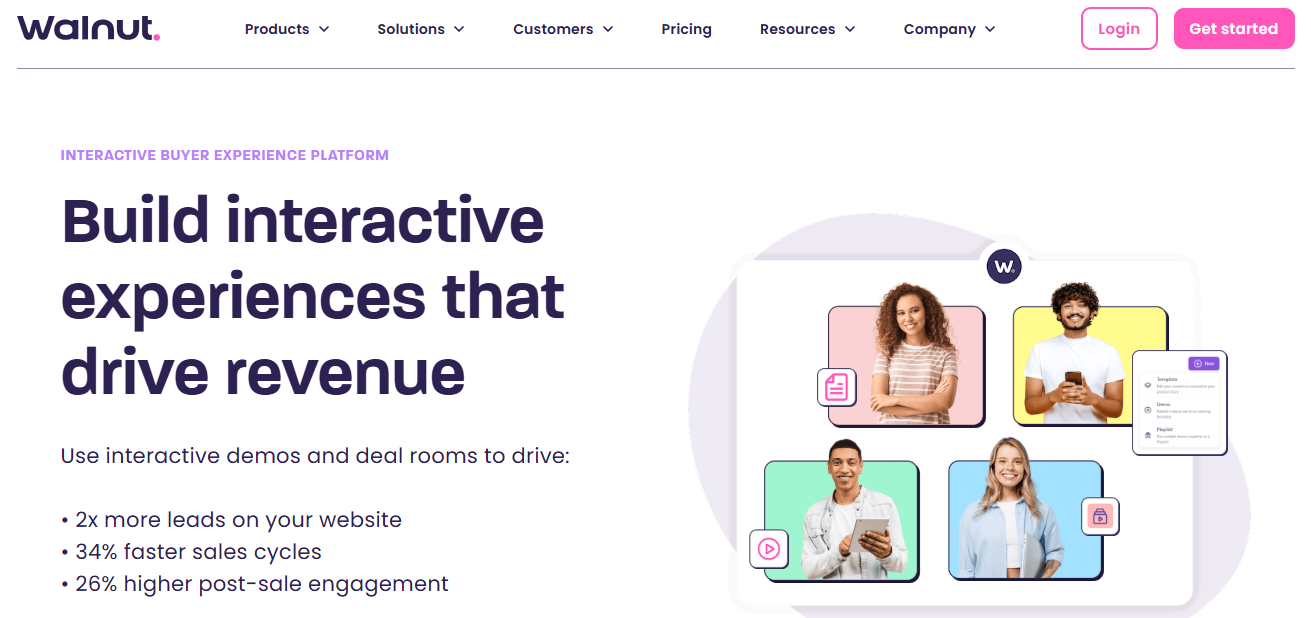
Another top name in demo automation, Walnut.io stands out for its high-level customization capabilities and emphasis on delivering bug-free product demos. With Walnut, small businesses can craft product experiences that simulate being live without needing the support of engineers.
Key Features:
- No-Code Editor: Create and edit demos without technical skills.
- Smooth Personalization: Customize demos for various industries, personas, or use cases.
- Data-Driven Insights: See which sections of the demo prospects interact with most.
- Team Collaboration: Let sales and marketing collaborate on creating demos.
- Embed Anywhere: Embed demos in landing pages, emails, or share links directly.
Why It's Great for Small Businesses:
Walnut is great for companies that need pro-grade demos without incurring costs on heavy tech support. Its intuitive editor makes it so that small teams can easily create and share well-refined demos.
Example Use Case:
A tiny e-commerce SaaS business might employ Walnut to demonstrate to store owners how to create their first online store in a few clicks—without having to make a live demo call. It reduces the burden on the sales team while enhancing customer onboarding.
3. Storylane
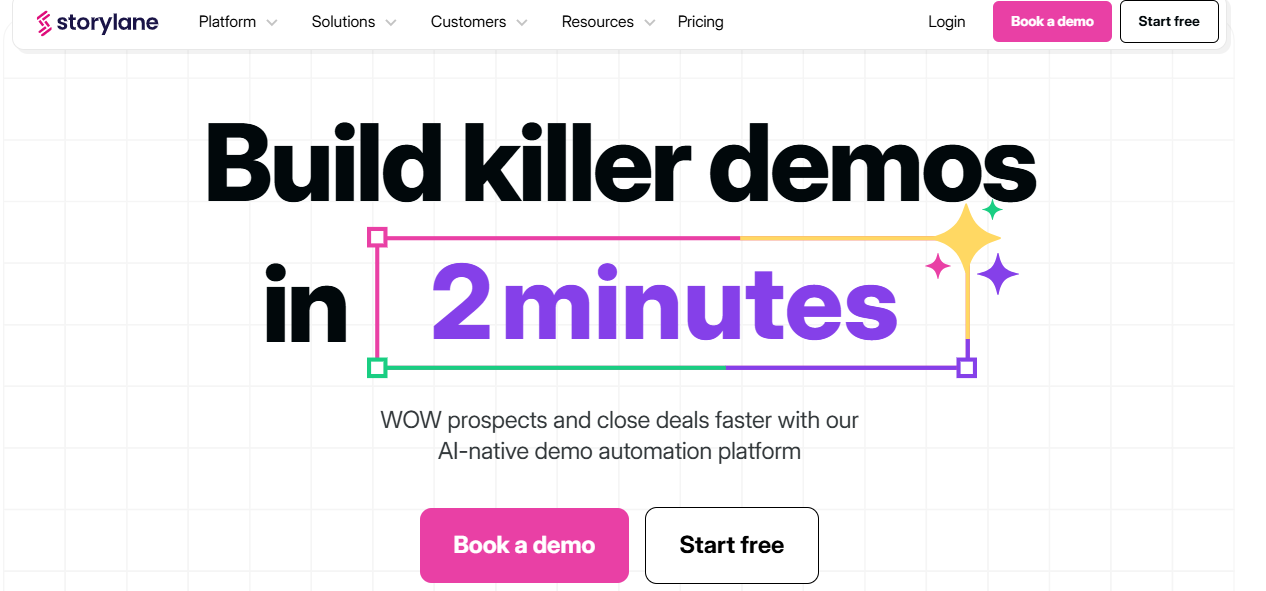
Storylane is a top player in the demo automation market for smaller businesses seeking to speed up sales cycles. With its focus on interactivity and insights, Storylane enables businesses to present value more quickly.
Key Features:
- Interactive Demo Builder: Design demos that mimic real-time product interactions.
- Personalization at Scale: Replicate and customize demos for several customer segments easily.
- Lead Capture: Restrict demo access to capture email and grow your pipeline.
- Analytics & Heatmaps: See where prospects spend most of their time.
- CRM Integrations: Integrates with HubSpot, Salesforce, and others.
Why It's Great for Small Businesses:
Storylane benefits small businesses not only in creating demos but also in generating leads from them. The lead capture and analytics integration means sales reps waste time on qualified leads alone.
Example Use Case:
A tiny HR-tech firm would use Storylane to demonstrate how easy its platform makes payroll. Gating the demo helps them capture prospect emails, which are automatically pushed to their CRM, thus streamlining lead generation.
4. Demostack
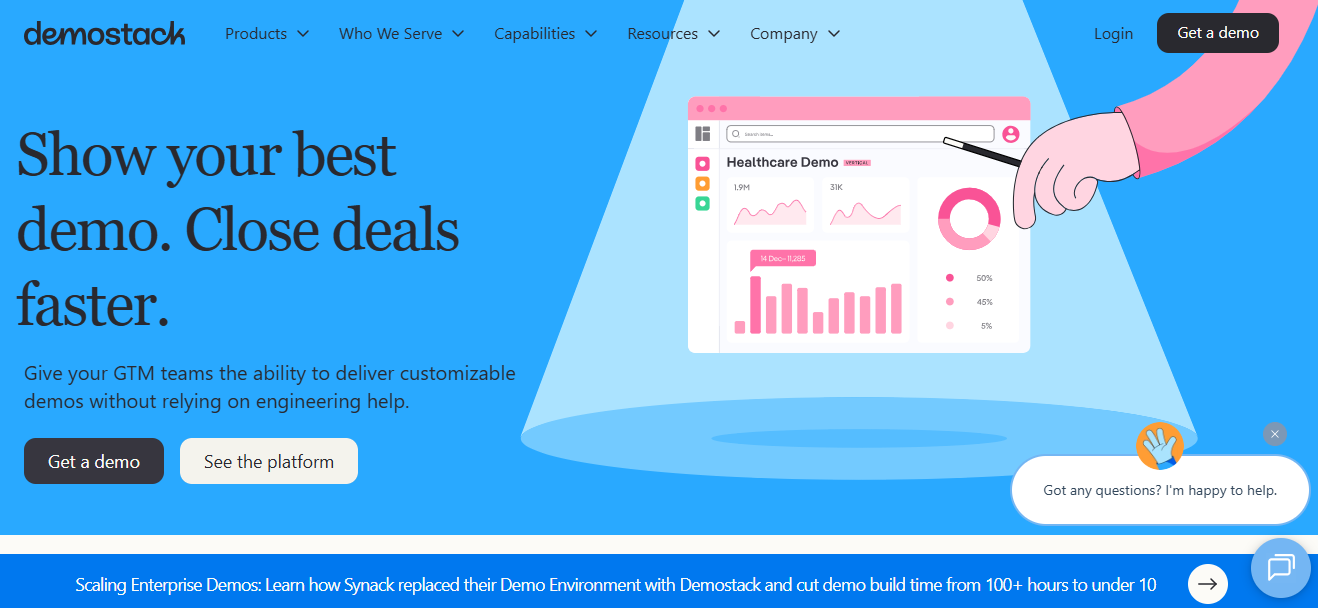
Demostack is built for the creation of realistic, data-driven product demos that enable sales teams to close deals quickly. It enables companies to replicate their product environment and customize it for various prospects without revealing sensitive information.
Key Features:
- Live Product Simulation: Duplicate your product for demos without impacting the actual environment.
- Personalized Demos: Tailor demo content to the prospect's business or industry requirements.
- Data Privacy: Redact or remove sensitive customer information in demos.
- Analytics Dashboard: Track engagement and measure the effectiveness of demos.
- Collaboration Tools: Sales and marketing can create and tune demos jointly.
Why It's Great for Small Businesses:
Demostack is especially useful for small companies that possess sensitive customer information but yet desire to have genuine product experiences. It provides security without any compromise on professionalism in the demo environment.
Example Use Case:
A fintech company can utilize Demostack to showcase its product using dummy customer data, so there is no compromise on sensitive information exposure. This makes prospects feel comfortable and keeps compliance intact.
5. Reprise
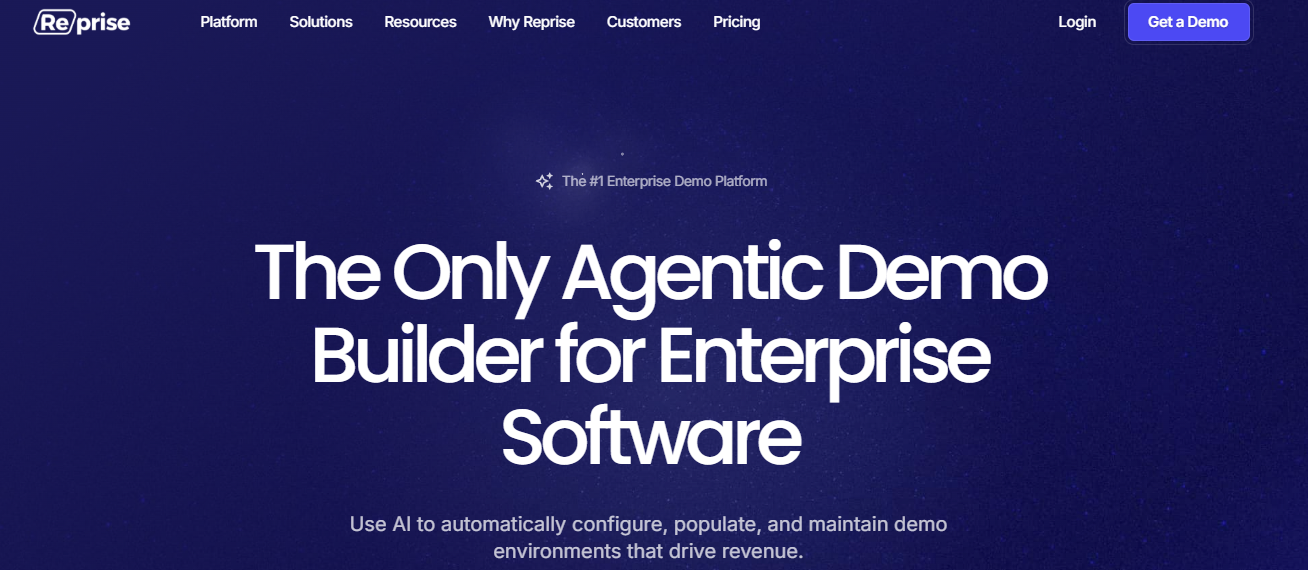
Reprise completes our list as of the best demo automation tools for small businesses. It provides both guided demos and self-guided tours, so it is adaptable to various sales strategies.
Key Features:
- Guided and Self-Guided Demos: Flexibility in using demos for live sales calls or sending links for on-demand inspection.
- No-Code Customization: Simple demo creation without engineering assistance.
- Product Tours: Highlight specific product features through brief, targeted tours.
- Advanced Analytics: Monitor how leads engage with demos.
- Integrations: Integrates with top CRM and marketing automation systems.
Why It's Great for Small Businesses:
Reprise offers flexibility that many small businesses require. You can either walk a prospect through a call or allow them to experiment on their own, and Reprise accommodates both approaches.
Example Use Case:
A small project management software company could use Reprise to create multiple demo paths—one showing features for freelancers, another for small teams. This tailored approach helps resonate with different audiences without extra effort.
Comparing the Top 5 Demo Automation Tools
Now that we’ve explored the five best demo automation software for small businesses, here’s a quick comparison of how they stack up:
Selecting the Best Demo Automation Software for Your Small Business
The best choice is based on your business needs, budget, and target audience. For instance:
- If you desire the lowest cost, easiest-to-use option → use Hexus.
- If your business demands high customization and professionalism → use Walnut.
- If lead generation is your priority → Storylane wins.
- If sensitive information is involved → Demostack is the best for you.
- If flexibility in live and self-guided demos is what you seek → Reprise is the way to go.
Pricing Breakdown of Top Demo Automation Tools
How Hexus Demo Automation Tools Help Small Businesses
Spending money on demo automation software is only the first step. Small businesses need to implement best practices in their demo strategy to fully realize the benefits.
1. Define Clear Objectives
Ask yourself: What do we want our demos to accomplish? Lead generation? Shorter sales cycles? Improved onboarding? This clarity will make your demos purpose-built.
2. Keep It Simple
Don't overwhelm prospects with an excessive number of features. Instead, emphasize key value propositions that solve pain points head-on.
3. Personalize Where Possible
Small adjustments—like adding the prospect's name, company logo, or industry-specific examples—can significantly enhance engagement.
4. Use Analytics Actively
Don't simply gather demo analytics—use them. If, for example, a prospect spends more time on one particular feature, sales reps need to follow up using that interest.
5. Blend Live and Automated Demos
Automating isn't about cutting out human interaction. A hybrid solution—where prospects view demos independently and subsequently attend a live call for questions—usually yields the highest success.
6. Update Demos Periodically
Just like your product, your demos must also change as time passes. Dated demos can damage credibility, so make regular reviews and updates them regularly.
Real-World Scenarios: How SMBs Use Demo Automation
Let's make this concrete and see some real-world examples of demo automation software in use across various industries.
SaaS Startups
A SaaS company that provides project management software can leverage Hexus to build an interactive demo embedded on its website. Potential users can test out task creation, file sharing, and collaboration features immediately—resulting in increased sign-ups.
E-Commerce Solutions
An e-commerce site might utilize Walnut to produce a professional-grade walkthrough demonstrating how merchants establish their web stores. This lessens the required time-consuming sales calls and hastens merchant adoption.
HR Tech Businesses
By utilizing Storylane, an HR tech business could develop demos highlighting how payroll and employee information are handled. By gating, they also garner leads directly from demo viewers.
Fintech Businesses
A fintech organization can use Demostack to stage account dashboards with fake financial information, being compliant while still giving a real feeling.
Productivity Tools
A small business providing collaboration software can utilize Reprise to give both guided demos for sales calls and self-guided demos for prospects visiting their website.
Expert Tips for Small Business Owners
The following are some expert-supported approaches to leveraging demo automation:
Start Small, Scale Later: Launch with one or two fundamental demo flows. After witnessing traction, scale to multiple demo versions.
Align Sales and Marketing: Make both teams work together on demo development so messaging is aligned across campaigns and sales pitches.
Leverage Demo Analytics in Sales Pitches: In the event that analytics indicate that a lead heavily interacted with a particular feature, bring it up in subsequent conversations for more relevance.
Test and Iterate: Like websites and advertisements, demos can be A/B tested. Experiment with various flows to determine which one drives greater conversions.
Don't Neglect Mobile: Prospects will see your demo on mobile. Ensure that your demo application supports responsive, mobile-based experiences.
Future Trends in Demo Automation for Small Businesses
As technology continues to advance, demo automation software will continue to be more powerful and user-friendly. Some of the emerging trends small businesses must look out for in 2025 and beyond include:
- AI-Powered Personalization: There will be AI that will automatically customize demos to each prospect's needs.
- Voice-Guided Demos: Integration of voice assistants to allow for hands-free guided navigation.
- Deeper CRM Integration: Automated synchronization of demo analytics with CRM for hyper-personalized follow-ups.
- Augmented Reality Demos: Particularly for product-oriented small businesses, AR-fueled demos will enable customers to "see" products around them.
- Freemium Models: Additional platforms can offer free versions, which will make demo automation all the more affordable for early-stage startups.
Final Thoughts
Selecting the best demo automation software for small business can revolutionize the way you attract, engage, and convert customers. These solutions are no longer exclusive to huge businesses—small businesses now have affordable, easy-to-use solutions that enable them to play on equal footing.
- If cost-effectiveness and simplicity are your top concerns, Hexus is your best choice.
- For professional, enterprise-level finish, use Walnut.
- If lead generation is at the heart of your strategy, select Storylane.
- For businesses that need data protection, Demostack is the best.
- And if you have to be flexible in demo formats, Reprise provides the best of both worlds.
Ultimately, the correct demo automation software isn't just time-saving—it builds trust, demonstrates value, and closes more deals. For small businesses facing a competitive market, this can be that one thing that makes all the difference.

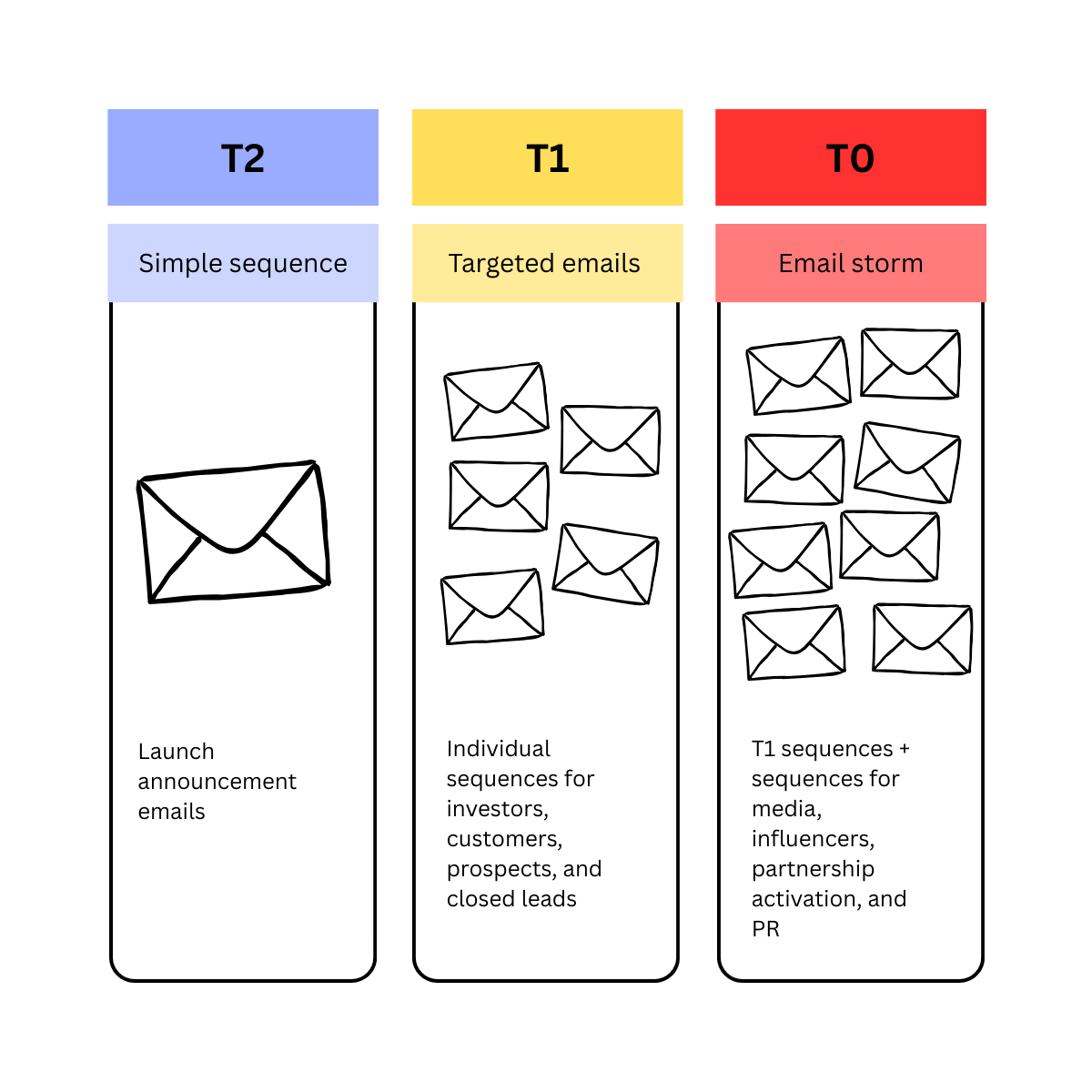
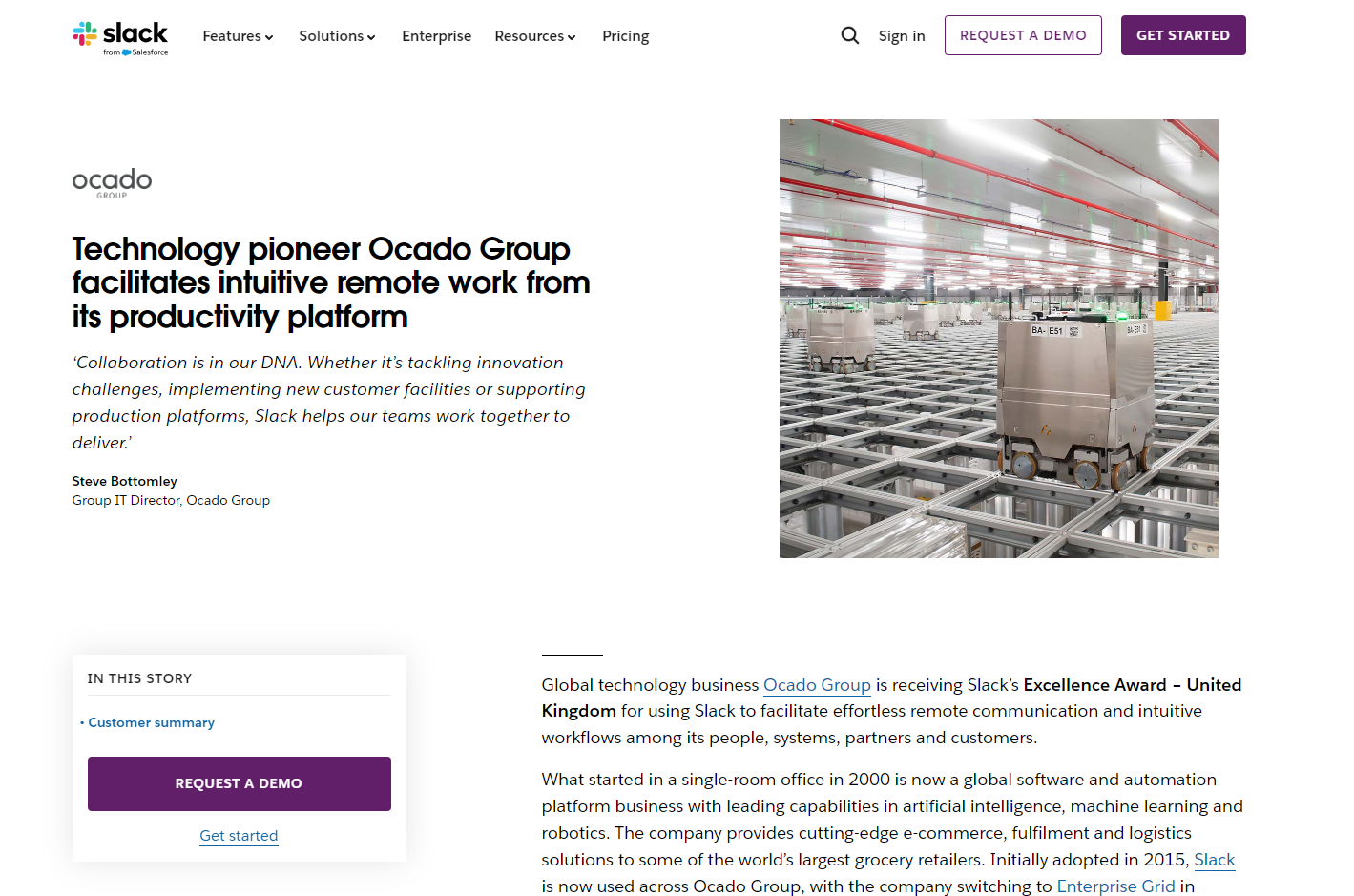
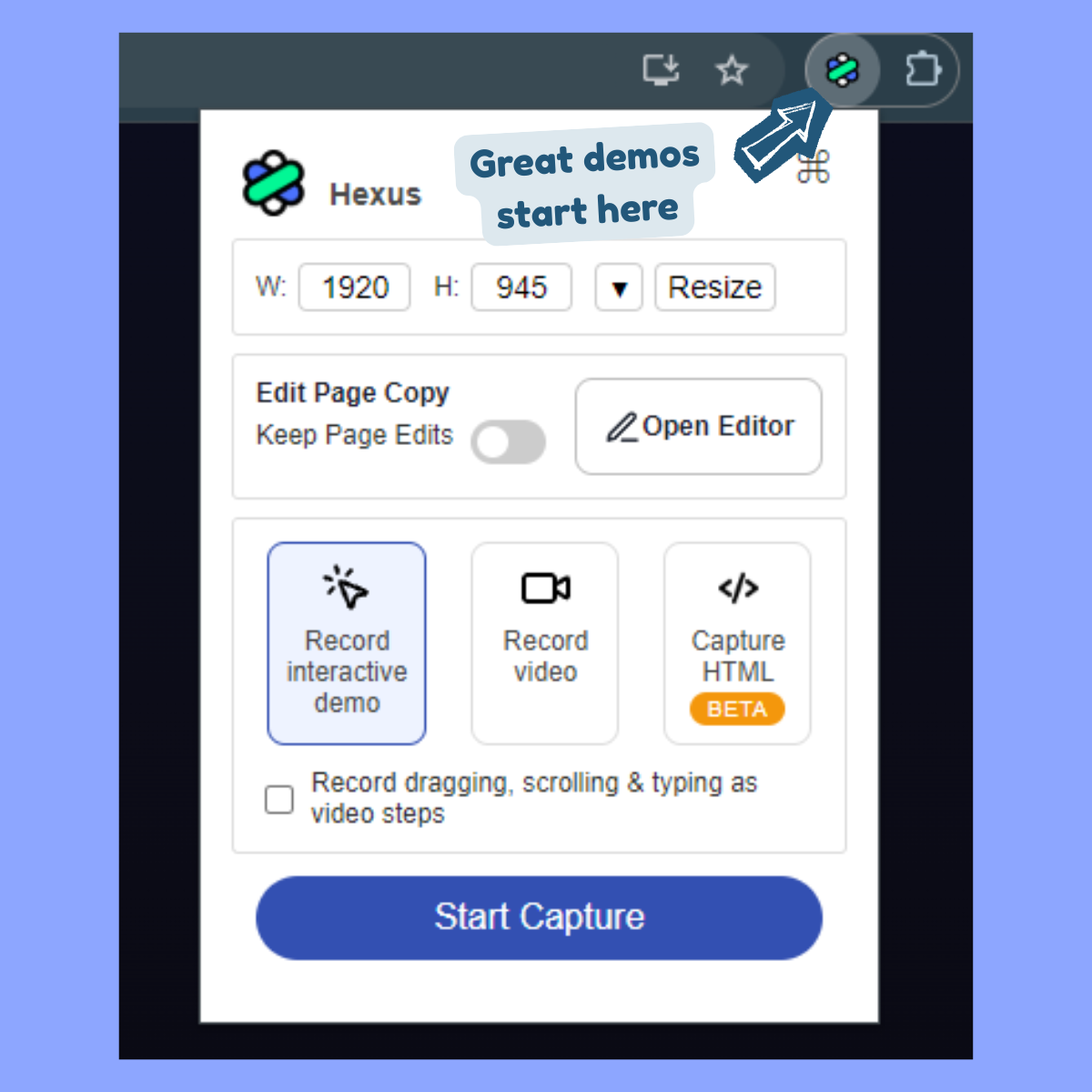

.png)

.png)